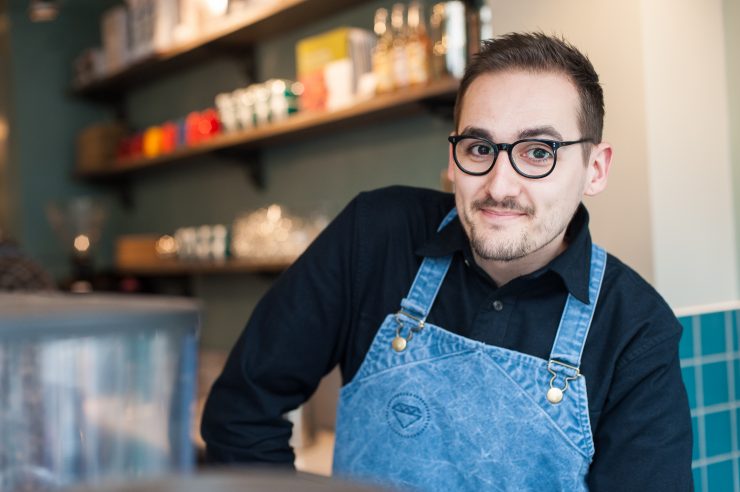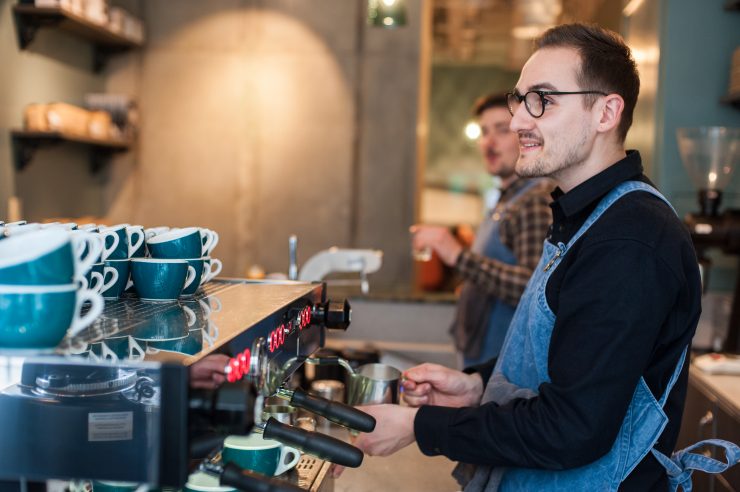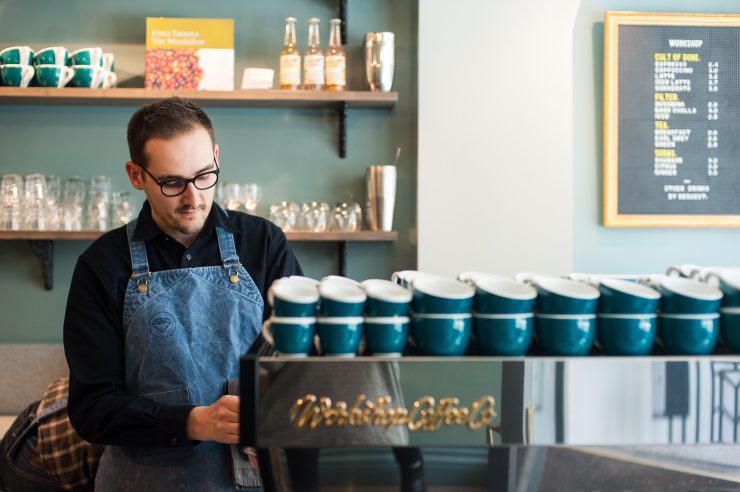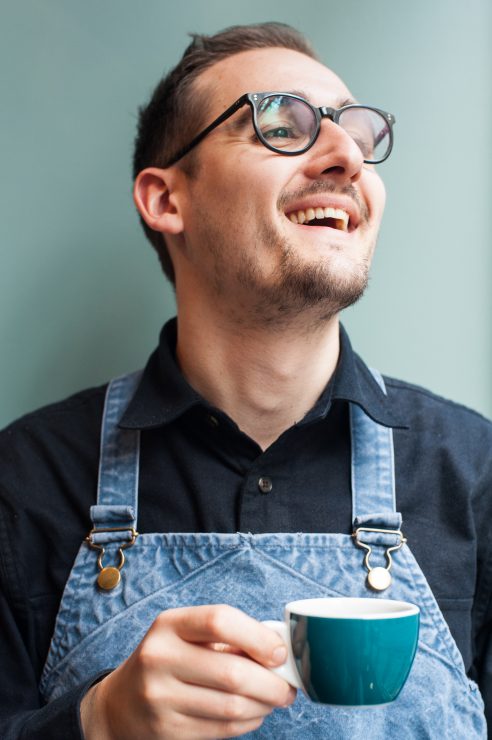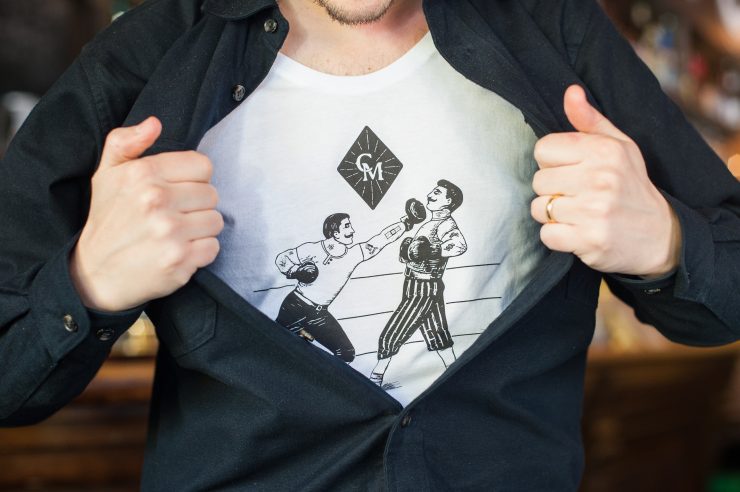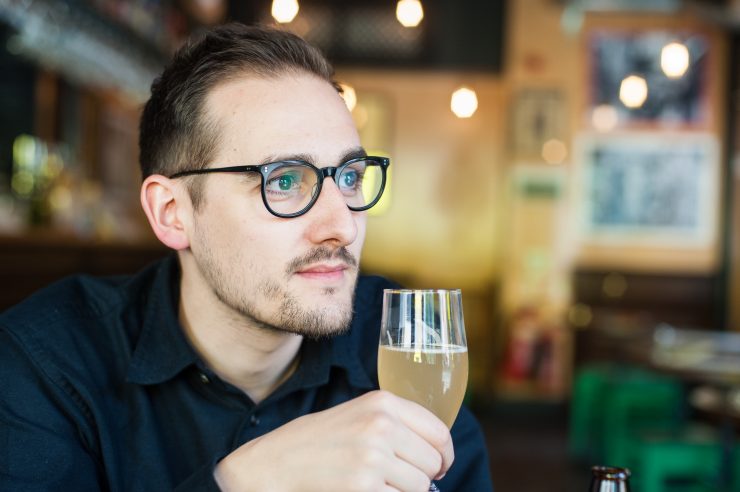Here’s one thing you might not know about James Bailey, the world’s first Coffee Masters tournament champion: he never intended to have a career in coffee. When he started his part-time job at the student union cafe at the University of Sheffield, it was the furthest thing from his mind. The way he saw it, he could either work part-time in the cafe or a bar whilst pursuing a bachelor’s degree in philosophy, and at the bars it was a lot harder to get free drinks. So to the cafe he went, for the free study fuel and the better atmosphere.
Here’s another thing you might not have known about Bailey: not only is he a master of coffee, he is a Master of Philosophy. When he moved to London a year after completing his undergrad, following a short stint of full-time work and training at the student union cafe, he was there to complete a two-year Masters of Philosophy at University College London. When he dipped his toe into the specialty coffee industry, it sucked him in and wouldn’t let him go. From Fernandez and Wells to Prufrock, his involvement escalated from casual part-time barista to someone who thirsted to know more—so eagerly, in fact, that he fast-tracked his Masters degree, wrote his dissertation quickly so he could finish the course in a year, and left academia behind forever to follow the white rabbit of coffee.
His dissertation focus? The ontological status of objects using olfactory rather than vision as the primary medium. Try and follow along: “Existence and objecthood,” he tells me. “What does it mean for something to exist? Does something exist as a snapshot in time or does it exist through time? Does it occupy spatial boundaries or is it just a concept? Basically, I was trying to say most philosophical arguments about objects and existence are using sight, there are a few using sound, but I wanted to use smell as a medium to examine how we interact with the world via smell and what that tells us about an object’s existence. I came to a really weird conclusion for it, which was that most objects or things are a lot bigger, spatially and temporarily, than we even think they are by looking at them. Things can overlap and things can linger in a very poignant way.”
I’m ready to beat a hasty retreat back to solid ground for both of us, to ask him about brewing ratios or something, but instead I try to connect the two subjects for the sake of this interview. Does he see a lot of overlap between his academic training in philosophy and his career in coffee? In the end, he decides not: “I don’t just want to wax lyrical about stuff. I’d rather do it.”
Of course, one of the things he’s decisively done is to set out to win the brand new Coffee Masters tournament, a brand new coffee competition that represents a kind of a tabula rasa (what up, Locke?) ready to be filled by a new generation of barista competitors. Bailey admits he didn’t quite know what he was getting himself into when he entered the competition, and therefore decided the best course of action would be to have a sense of humor about it all.
“What I understood the competition to be about, it seemed like it was going to be a little bit of a reaction to the very staid, sincere, quite serious status of the barista competitions. I thought, ‘Fuck it, let’s do something really fun and bright and colourful and silly.’ So I did a flaming Tiki booze cocktail with coffee in it.”
The cocktail he crafted for his competition entry video was a punchy boozefest based around the “winey, saturated” Kenya Kabingara AA, a coffee previously offered by Workshop. Bailey paired this co-starring with unrefined palm sugar, Matahari absinthe, Germana cachaça, and Diplomatica Exclusiva Reserva rum. There was a cezve; there were flames; there was a Tiki man glass. It was flashy enough, along with his coffee credentials, to win him a spot in the competition lineup, but he further refined his signature drink before he went onstage. Since the Kabingara was no longer available, he went for the slightly more subtle Githiga AA, also a Kenyan coffee, which he called “slim, focused, and elegant”.
“I thought I should respond to the coffee with how I prep the drink,” Bailey says. “I toned down some of the strong alcohol because it was going to be very overwhelmed with booze. It was a very gentle coffee. I ended up steeping the cachaça with the coffee for two days before to get a real hit of coffee flavor from that small dose of cachaça, and used a slightly heftier brew.”
Once on the competition floor, Bailey still wasn’t quite sure what to expect. He feels it wasn’t something you could prepare for in the way you prepared for traditional barista competitions, where you get fifteen minutes to show months worth of preparation. “It’s very structured, very formal. You’re expected to do certain things.” And he would know—his short-lived UKBC career in 2012 saw him shoot straight to the top, bagging the “Best Newcomer”, “Best Espresso”, and “Best Signature Drink” awards, and placing second in the nation to then first-time champion Maxwell Colonna-Dashwood.
Here, as with the UKBC, however, he feels that information is key. In not being sure what to expect, he erred on the side of explaining too much rather than too little, explaining his choices at great depth to the judges and engaging with them with his routine. “[This competition] was like a dipstick test for where you are as a barista. If you’ve been doing stuff for a while and you can pose and handle a bit of pressure and you can move quick and clean, you’ll do pretty well,” he says.
It wasn’t without its tense moments, though. In the first round, Bailey was sure he was going to be knocked out when he horribly messed up a competitive test of drinks. Competitors were given a random docket of 10 drinks to make in nine minutes, comprising all combinations of drink types and milk types. In the heat of the moment, he steamed and poured with soy milk when he meant to pour with regular milk (the stuff of barista nightmares). In that moment, he was sure he was a goner. But he garnered enough points in the other rounds to scrape through and go on to win the whole damn thing.
With his £5,000 prize, Bailey is looking forward to taking a holiday to Arbois in the Jura region of France and bringing back as much wine as structurally possible to fit in a suitcase. Also, a sofa. “We’ve never had a sofa. Me and my wife Claire sit in two chairs at home, like an old couple. I feel like we should buy a sofa.” Any sofa? “No, it’s a proper nice sofa, a Mags Hay sofa. We’ve wanted to buy it for a long time.”
As the event’s first champion, Bailey hopes to be involved in Coffee Masters again in any way he can, whether it’s competing, judging, or as an MC. “It was a breath of fresh air,” he says of the tournament. “I got to meet and compete with some really good people. Probably the best thing that came out of it was, I invited Patrick [Rolf Karlsen of Berlin’s Five Elephant] to a cupping we were doing the day after the competition. He came and had some rather poignant and focused feedback for us, which is rare to find, and I had a really good chat with him about roasting coffee, QC [quality control], approaches to roasting… I mean, I’m still learning as much as I can, and I think I can learn a lot from him.”
Even for a Master of Coffee and Philosophy, there is still much left to learn.
Kate Beard (@SBinLondon) is a London-based photographer and writer. Read more Kate Beard on Sprudge.
The post Meet The World’s First Coffee Masters Champion: James Bailey of Workshop Coffee appeared first on Sprudge.


